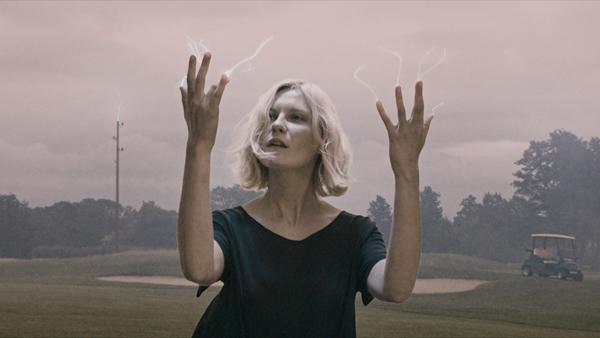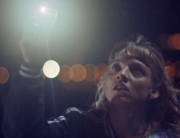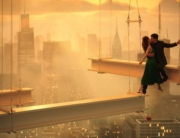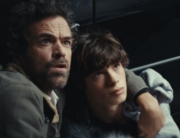
Kirsten Dunst in MELANCHOLIA (Photo: Magnolia Pictures)
Written & Directed by Lars von Trier
Produced by Meta Louise Foldager & Louise Vesth
Released by Magnolia Pictures
Denmark/Sweden/France/Germany. 135 min. Not rated
With Kirsten Dunst, Charlotte Gainsbourg, Alexander Skarsgard, Brady Corbet, Charlotte Rampling, John Hurt, Stellan Skarsgard, Udo Kier & Kiefer Sutherland
Sometimes you can’t quite tell if what you’re feeling is agony or relief—in movies and in life. If there’s one thing Lars von Trier achieves with perfection nearly every time it’s conjuring real feelings as part of the world of his films. And in the emotional tar pit that is Melancholia, the difference between agony and relief is nearly imperceptible as much as ever.
The film consists of two distinct halves. In the first, newlyweds Justine (Kirsten Dunst) and Michael (Alexander Skarsgard) arrive late to their wedding reception, keeping their wealthy and stifling group of friends and family waiting. It isn’t long before Justine’s clinical depression sets in so forcefully it debilitates her, and the reception crumbles as the couple moves from ritual to ritual, each one feeling more perfunctory than the next. At first it’s hard for her merely to take part in a modest toast, but eventually she can’t even look her darling groom in the eyes. It is tragic. Agonizing. But von Trier, who has been exorcising the demons from his own personality in at least his last two films and describing mental illness in a terrifyingly personal way, still insists on his usual irony. Every agonizing moment in the first half of Melancholia brings with its pain a kind of freedom. With each of her breakdowns during the opulent reception, one gets the feeling Justine might be better off dissolving her familial relationships. She’s not cut out for the lifestyle or to play the part of the beaming bride. Kirsten Dunst deserves all the praise she’s been receiving for her work here. The rest of the adept cast is excellent all around.
The second half finds Justine attempting a recovery in the safety of her sister and brother-in-law’s country home. Charlotte Gainsbourg (Antichrist) gives another brilliant performance for the unrelenting von Trier as Claire, while Kiefer Sutherland invokes a bit of 24’s Jack Bauer as her brusque husband John. The trio holes up on the estate in expectation of an approaching planet called (appropriately for this film) Melancholia, which is on a collision course with Earth. Little by little, Justine’s depression infects the reluctantly sympathetic and practical Claire, who becomes inconsolable. What at first feels like a relief from the confrontations of the first half ends up in an even more painful place as we continue to be aware of the dichotomy of pain and relief.
Should the planets collide, would it bring ecstasy or horror? Everything in von Trier’s world is a hive of psychology, and he is intent on delivering an implicit lesson in what seems like every shot. He is rigorous in his exploration of clinical depression, especially in this and 2009’s Antichrist. Interestingly enough, compare this pessimistic slog through the depths with 2000’s Dancer in the Dark, in which von Trier throws every conceivable hardship at his protagonist, Selma (Bjork). She counters not with depression but with the opposite—she’s maybe the most optimistic character ever rendered, trapped in the craggy heart of the cruel, cruel world. Though his characters have changed, his theme has not. Lars von Trier is sad.
Melancholia doesn’t go very far in reasoning, mind you. It’s pure description—this is how difficult it is to live in the world. Because of this, I’m plain afraid to even speculate on its intended message. I believe von Trier has the intellect to really tell us something we can walk away from the theater with, and he has a long string of films that do. His last pair, though, in all their miserable darkness and downright pessimism, has really been scaring the hell out of me.






Leave A Comment